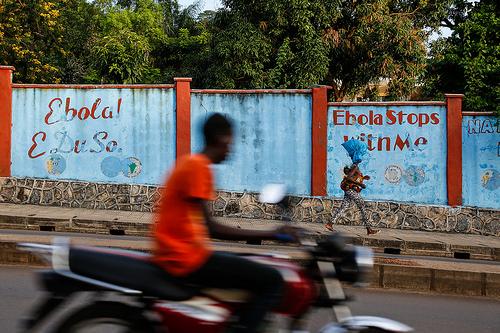No new Ebola cases were reported in West Africa's outbreak region last week, and if no cases are reported as of Jan 14, the whole area will be considered free of virus transmission, the World Health Organization (WHO) said today in an update.
In another development, the WHO confirmed that Liberia's recent cluster was due to lingering virus in an individual who had an earlier infection.
Guinea has now gone 30 days without a new case, and its outbreak will be considered over on Dec 28 if no new infections are detected. Sierra Leone was declared free of the virus on Nov 7.
Lingering virus sparked Liberia cluster
Liberia was the last country to report cases, a family cluster that included a 15-year-old boy who died of his infection. The virus also sickened his father and brother. All contacts associated with the cluster have now completed their 21-day monitoring periods, and 210 people linked with the cluster received the experimental VSV-EBOV vaccine as part of an ongoing ring-vaccination trial under way in the outbreak region.
In its update today, the WHO had new details on the investigation into the source of the family cluster, which it had suspected to be linked to lingering virus in a survivor. It said the cluster was sparked by reemergence in a previously infected individual. The report didn't specify the individual or the transmission route, but Gregory Hartl, a WHO spokesman, said the individual was one of the family members.
The WHO has said that Ebola flare-ups such as the one in Liberia are inevitable but rare and that they are still a concern, requiring aggressive surveillance and rapid response. The WHO's update said the reemergence risk also shows the importance of having services in place for survivors, which includes testing body fluids for Ebola virus RNA.
Governments in Liberia and Sierra Leone—with help from the WHO and the US Centers for Disease Control and Prevention (CDC)—have set up voluntary semen screening and counseling programs for male Ebola survivors. To address the other lingering health effects from the disease, which can be severe, the two countries are expanding clinical services for survivors and are expected to complete their plans for comprehensive care of Ebola survivors in January.
Ebola vaccine set to enter new trial
In another survivor-related Ebola development, Guinea's health ministry and the WHO are planning to launch a new clinical trial that will involve offering the VSV-EBOV vaccine to people at risk for Ebola transmission from survivors, Stat News (STAT), a new health-focused venture from the owner of the Boston Globe, reported yesterday. The report said the new trial is intended to shrink the risk of survivor-related infections.
Marie-Paule Kieny, PhD, the WHO's assistant director-general for health systems and innovation, told STAT that the new clinical trial could also help answer questions about the vaccine. For example, researchers are concerned that people who have had close contact with survivors may already have low levels of Ebola antibodies, which wouldn't be enough to protect them from infection and could block any vaccine benefits.
Studying the vaccine in survivor contacts should help shed light on the issue, she said.
Earlier ring vaccination trials of VSV-EBOV in Guinea showed that the vaccine was highly effective, so much so that it was extended to Sierra Leone and then most recently to Liberia. The vaccine was developed by Canadian researchers and is licensed by NewLink Genetics and Merck.
Ebola prognosis indicator
In research developments, a study of Ebola patients at a treatment center in Sierra Leone at the height of the outbreak found that a patient's viral load in the initial blood test seems to be a good survival indicator. An international research team including scientists from the CDC, Sierra Leone health ministry, and Doctors without Borders (MSF) reported their findings today in the latest online edition of Emerging Infectious Diseases.
The team evaluated 216 of 227 Ebola patients who were treated in an Ebola treatment center in Sierra Leone's Bo district between Sep 12, 2014, and Jan 7 of this year. Their goal was to assess whether two factors were survival prognosis markers: time from symptom onset to health facility transmission and Ebola viral load in the first blood sample.
Time from symptom onset to admission wasn't linked to survival, but they found that viral load was inversely associated with survival, which they said could be help clinicians make treatment decisions and manage patient and family expectations.
See also:
Dec 16 WHO Ebola update
Dec 15 STAT story
Dec 16 Emerg Infect Dis study


















